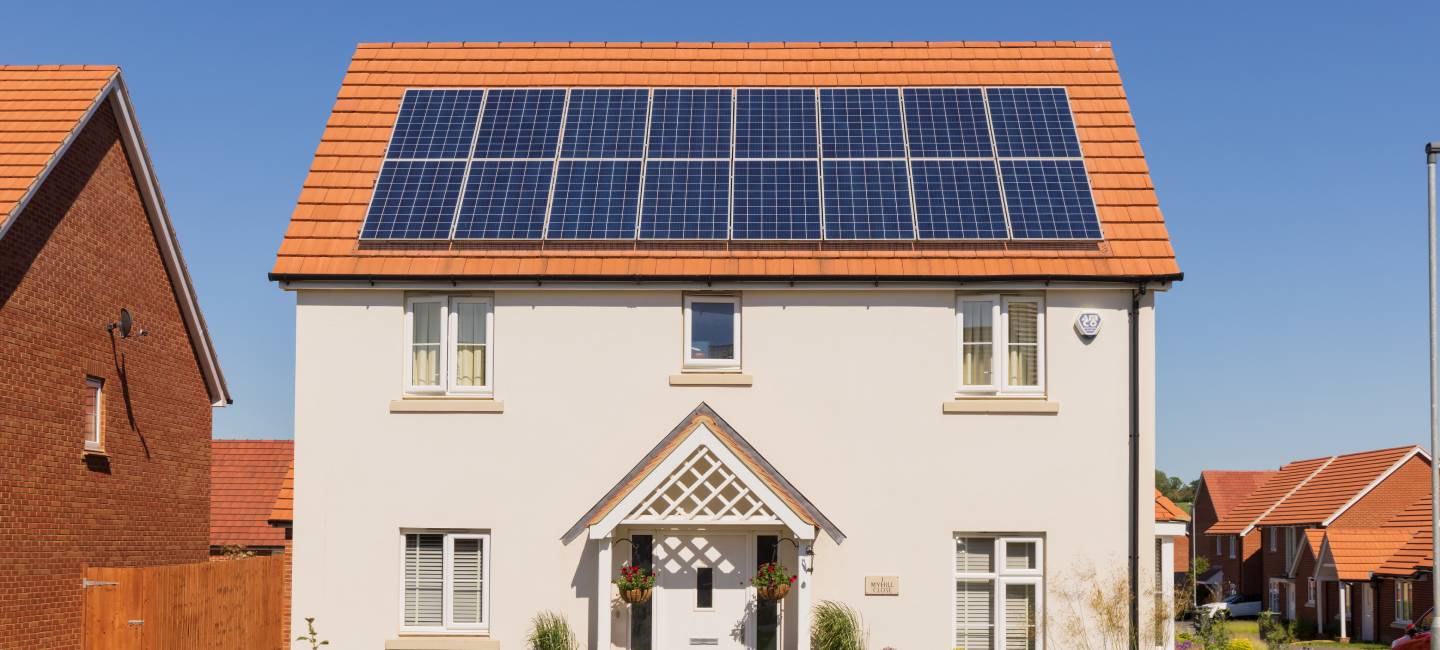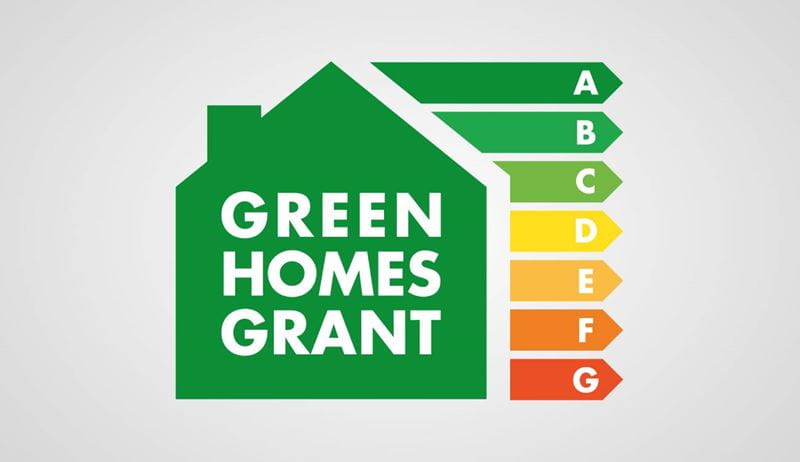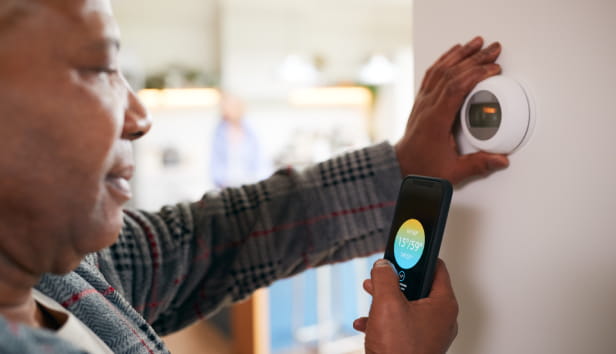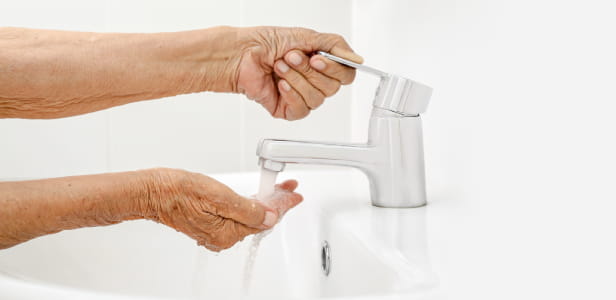
This article is for general guidance only and is not financial or professional advice. Any links are for your own information, and do not constitute any form of recommendation by Saga. You should not solely rely on this information to make any decisions, and consider seeking independent professional advice. All figures and information in this article are correct at the time of publishing, but laws, entitlements, tax treatments and allowances may change in the future.
Want to slash your energy bills, boost your home's comfort, and play your part in a greener future? Now could be the perfect time. As the UK strives towards its net-zero goals, there’s millions of pounds of funding available for grants designed specifically to help homeowners and eligible renters improve their property's energy efficiency.
Whether it's upgrading your boiler to a heat pump, installing better insulation, or even adding solar panels, substantial financial help is on offer. There are restrictions though. Many of the grants are targeted at households on lower incomes and living in homes with poor energy ratings.
Louise Shooter, policy manager at industry body Energy UK, says it’s a win-win for the government and consumers. “Making homes more energy efficient not only benefits the environment but also provides significant cost savings. Low-carbon technologies, such as heat pumps and solar panels, can help reduce energy bills while potentially increasing property value.”
So, what energy grants are available and how can you apply?
What’s on this page?
The Boiler Upgrade Scheme gives homeowners in England and Wales financial support to install low-carbon heating systems such as heat pumps and biomass boilers.
You could get up to £7,500 towards an air-source or ground-source heat pump or £5,000 towards a biomass boiler. The scheme is open to homeowners and private landlords with properties that meet insulation requirements. You can’t get a grant for most new build properties or social housing.
Applications are made through accredited installers, who will give you a quote upfront for the work. You can find an accredited installer through mcscertified.com. The installer will apply on your behalf on the Ofgem website. The government payment will be taken off the amount you pay for installation.
Gerald Charles, head of retrofit at the Centre for Sustainable Energy, says that applying for grants such as the Boiler Upgrade Scheme and home insulation support should be straightforward. An accredited contractor should be able to help explain whether you qualify for the grant.
The main criteria are:
You are not eligible if:
Miatta Fahnbulleh, Parliamentary Under-Secretary of State at the Department for Energy Security and Net Zero, says that living in a warm, comfortable home should not be a luxury.
“By giving this funding to local authorities and social housing providers we are delivering on our promise to improve the homes of thousands of people across England, upgrading cold and draughty homes so they are warmer, cleaner, and cheaper to live in,” she told Saga.
The scheme isn’t available in Scotland, but you can apply for a separate grant and interest-free loan through Home Energy Scotland totalling £15,000. There is no similar boiler replacement scheme in Northern Ireland, but you can find out what other energy-saving grants are available in Northern Ireland.
The Great British Insulation Scheme is a government energy efficiency scheme formerly known as ECO+. It aims to reduce energy bills by helping with the cost of installing new home insulation, such as cavity wall or loft insulation.
The scheme was set up to help up to 300,000 households in the UK. The amount of funding provided depends on the household's income and the level of work needed.
Rebecca Dibb-Simkin, chief product and marketing officer at Octopus Energy, explains that small changes to a home’s insulation and ventilation can go a long way to keeping people warm and cosy while limiting the need to crank up the thermostat. “The government has set aside money to support households to make these changes, so we encourage our customers to get in touch with us to see what’s available.”
You might be eligible for insulation support if:
You can be a homeowner, landlord or tenant (either renting privately or from a housing association) to apply. If renting you’ll need your landlord’s permission.
Again, this scheme is not available in Northern Ireland. Check here for energy saving schemes in Northern Ireland.

ECO4 is available to households receiving certain income-based benefits, such as those who receive the guarantee credit element of pension credit, and those in households with an EPC rating of D to G. It’s available whether you own your home or rent it (as long as your landlord gives their permission). It’s also available if you live in social housing, whether or not you receive benefits.
If you’re eligible for EC04, you could have the cost of heating upgrades paid for in full by a grant. This could include a boiler upgrade, air source heat pumps, solar panels or double glazing.
ECO4 is a UK-wide scheme overseen by Ofgem and delivered by energy companies. It runs until 31st March 2026.
You can find out more about ECO4 through the regulator Ofgem’s website. You can apply through any of the obligated energy suppliers – it doesn’t have to be your own supplier that does the work.
The Warm Homes Local Grant provides energy performance upgrades and low-carbon heating solutions through local authorities. It provides grants to households living in privately-owned homes in England with an EPC rating of D to G and a household income below £36,000.
Whereas ECO4 is delivered by energy suppliers, Warm Homes funding is delivered by local authorities.
Delivery of the Warm Homes grant started in April 2025 and will be rolled out across 270 local authorities over the next three years.
You can check whether you are eligible and apply through the government website.
The Warm Home Discount Scheme isn’t an energy-efficiency scheme, but provides a one-off £150 discount off your electricity bill. The money is not paid to you. It is paid to your electricity supplier, which applies the discount to your bill.
The scheme is currently closed and will reopen in October 2025. You usually get the discount automatically if you’re eligible – either if you get the guarantee credit element of Pension Credit, or if you’re on a low income.
But if you’re on a low income in Scotland, you’ll need to apply yourself by contacting your energy supplier directly. Northern Ireland has the Affordable Warmth scheme.
The Energy Saving Trust offers information and support for households in England, while Home Energy Scotland provides guidance for Scottish residents. In Wales, you can get support through the Welsh government’s Nest scheme.
Shooter from Energy UK says she encourages customers to discuss energy efficiency options with their energy supplier as many now offer tailored product packages and tariffs to support customers in transitioning to low-carbon solutions while saving on energy costs.
Be aware of energy scams. Avoid cold calls or doorstep sellers offering ‘government grants’. Always verify funding through official sources.
Read more about energy scams


Provided by Tembo
Find out all you want to know about mortgages with expert advice.

Learn how to reduce your energy bill without living miserably.

Find out the benefits you are entitled to, from Pension Credit to Carer’s Allowance.

From energy to food to transport, we reveal what's expected to happen to prices over the coming year.


.jpg?la=en&h=354&w=616&hash=BE59986E855569FEC6926261D767F978)
